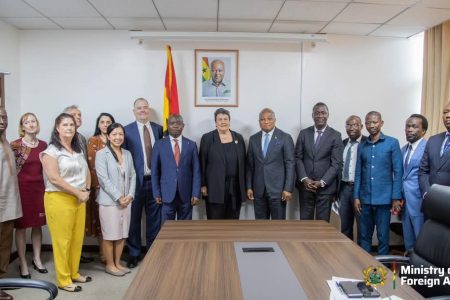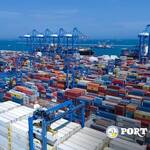The United States Ambassador to Ghana, Madam Virginia Palmer, has clarified that the recent 10% tariff imposed on certain Ghanaian exports to the U.S. is not a punitive measure against the country.
Rather, the tariff is part of a sweeping international trade realignment policy announced by the United States government.
Speaking during a high-level diplomatic meeting with Ghana’s Minister for Foreign Affairs, Mr. Samuel Okudzeto Ablakwa, in Accra, Ambassador Palmer explained that the tariffs are being implemented under the International Emergency Economic Powers Act (IEEPA) of 1977, a U.S. law that allows the executive branch to respond to extraordinary economic and foreign policy threats.
Ambassador Palmer was accompanied by senior embassy officials, while the Ghanaian side included the Deputy Minister for Trade, Agribusiness and Industry, Mr. Sampson Ahi, and representatives from the Ministry of Trade and Industry.
The discussions were held behind closed doors and lasted over an hour.
Ghana not singled out
Ambassador Palmer underscored that the tariff measure, which came into effect on Saturday, April 5, was part of a global policy shift and not directed specifically at Ghana.
“These tariffs are a broader part of the United States’ strategy to address longstanding global trade imbalances,” she said, adding that the U.S. remains committed to its strong economic partnership with Ghana.
She reassured Ghanaian officials that oil, gas, and other energy-related exports from Ghana would be exempt from the tariff regime.
However, goods exported under the African Growth and Opportunity Act (AGOA), a U.S. initiative offering duty-free access to qualifying African exports, are currently affected by the new measures.
The ambassador also revealed that discussions are underway to potentially secure exemptions for other strategic Ghanaian export sectors, particularly cocoa and garments, which form a vital part of the country’s economy and export earnings.
Ghana pushes for relief, cites job concerns
The Ghanaian delegation expressed concerns about the potential economic consequences, particularly for businesses and workers in the affected sectors. “There are real fears about job losses and reduced trade volumes,” said one official close to the talks.
Mr. Ablakwa is expected to brief President John Dramani Mahama on the outcome of the meeting and lead broader consultations with the Ghanaian trading community.
Government sources indicate that Ghana will intensify diplomatic engagement with Washington in the coming days to mitigate the impact of the tariff policy on Ghanaian exports.
Both countries affirmed their commitment to resolving the matter through bilateral channels, with an emphasis on safeguarding mutual economic interests and ensuring continued market access for Ghanaian goods in the U.S.
Trump’s tariff shock: A global reset
The new tariff regime stems from an Executive Order signed by U.S. President Donald Trump on Wednesday, April 2, 2025, citing economic and national security implications of the U.S.’s ballooning global trade deficit.
The policy imposed a 10% universal tariff on imports from virtually every trading partner, including Ghana.
The Executive Order invokes the IEEPA and allows for exemptions on specific products, including pharmaceuticals, semi-conductors, critical minerals, lumber, and energy products.
Notably, goods already in transit before the April 5 effective date are exempt from the tariffs.
In addition to the global 10% tariff, the U.S. has also announced reciprocal tariffs ranging between 11 and 50% on imports from over 50 countries, effective Wednesday, April 9.
Ghana’s export profile at risk
The new trade policy poses significant challenges for Ghana, whose key exports to the U.S. include apparel, cocoa derivatives, gold jewelry, shea butter, horticulture products, fruits, vegetables, root crops such as yam, and cashew. Many of these goods have long benefited from preferential treatment under AGOA.
According to trade analysts, the tariff threatens Ghana’s access to one of its most important complementary markets, which could disrupt supply chains, affect production, and squeeze small and medium-sized enterprises that rely on exports to the U.S.
Partnership endures despite headwinds
Despite the emerging tensions, both governments reaffirmed the strong and enduring nature of the Ghana–U.S. relationship, citing long-standing cooperation in areas such as trade and investment, education, health, and security.
“We are going to have new administrations in both countries, and Ghana remains the foundational country for the United States in Africa,” said Ambassador Palmer after the meeting, expressing optimism about the future of bilateral relations.
The U.S. embassy and Ghana’s ministries of Foreign Affairs and Trade have pledged to maintain close dialogue to identify mutually beneficial solutions and minimize the tariff’s impact on Ghana’s economy.
Next steps and diplomatic outreach
Ghana’s next diplomatic move will be closely watched as the country prepares to negotiate exemptions and relief for its critical exports. The Foreign Affairs Ministry has committed to updating the Ghanaian public and the trading community as discussions progress.
In the meantime, trade and policy experts suggest that Ghana may also explore regional and multilateral strategies, including engagements through the African Continental Free Trade Area (AfCFTA) and the Economic Community of West African States (ECOWAS), to cushion the impact and diversify market opportunities.
As both nations navigate these complex trade waters, their ability to maintain a spirit of cooperation and strategic dialogue will be critical in determining the outcome of this latest challenge in global commerce.
- IGP and team visit victims of Bawku police-youth clash - 12 April 2025
- Minority urges govt to act swiftly on Bawku security crisis - 12 April 2025
- Utility tariff hikes: Electricity-14.75%, Water-4.02% - 12 April 2025

